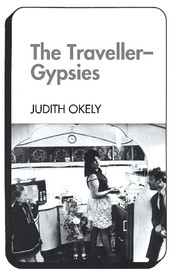Book contents
- Frontmatter
- Contents
- Dedication
- Preface
- 1 Historical categories and representations
- 2 Modern misrepresentations
- 3 Methods of approach
- 4 Economic niche
- 5 Self-ascription
- 6 Symbolic boundaries
- 7 Gorgio planning
- 8 Travelling
- 9 The trailer unit, spouses and children
- 10 Group relations and personal relatives
- 11 Gypsy women
- 12 Ghosts and Gorgios
- Concluding remarks
- Extract from The Scholar Gypsy
- Notes
- References
- Index
6 - Symbolic boundaries
Published online by Cambridge University Press: 04 December 2009
- Frontmatter
- Contents
- Dedication
- Preface
- 1 Historical categories and representations
- 2 Modern misrepresentations
- 3 Methods of approach
- 4 Economic niche
- 5 Self-ascription
- 6 Symbolic boundaries
- 7 Gorgio planning
- 8 Travelling
- 9 The trailer unit, spouses and children
- 10 Group relations and personal relatives
- 11 Gypsy women
- 12 Ghosts and Gorgios
- Concluding remarks
- Extract from The Scholar Gypsy
- Notes
- References
- Index
Summary
Explanations
It is often assumed that ‘culture contact’ brings change by a kind of contagion; the most technologically advanced economy and the dominant political group ‘infecting’ or rubbing off its culture onto the least technologically advanced and perhaps subordinate group. The Travellers are a case study for such relations. They have changed and adapted to some extent on their own terms. Their ritual beliefs show similar marks of independence within the system of the larger society. The Gypsies may indeed incorporate symbols, rites and myths from the larger society, but there is a systematic, not random, selection and rejection. Some aspects may be transformed or given an inverted meaning. The Gypsies, and possibly other oppressed groups, can be seen as bricoleurs (Lévi-Strauss 1966:17-21), picking up some things, rejecting others. The ideology of the dominant society is de-totalised, and the ultimate re-synthesised cosmology takes on a new coherence with perhaps an opposing meaning, and one which accommodates the Gypsies as an independent group. The Gypsies are not passively ‘copying’ the beliefs of the dominant society.
The Gypsies are under constant pressure from the dominant society to become assimilated. The problem is how to remain separate and different, while maintaining daily contact with Gorgios, to whom Gypsies must present many disguises. All roles, whether trickster, exotic or victim, carry the risk of self-degradation and a dangerous sense of unreality, unless the ‘inner self’ is protected intact, and unless the actor can distinguish between the self and the part. Group integrity must be maintained and expressed in some independent way.
- Type
- Chapter
- Information
- The Traveller-Gypsies , pp. 77 - 104Publisher: Cambridge University PressPrint publication year: 1983
- 1
- Cited by

